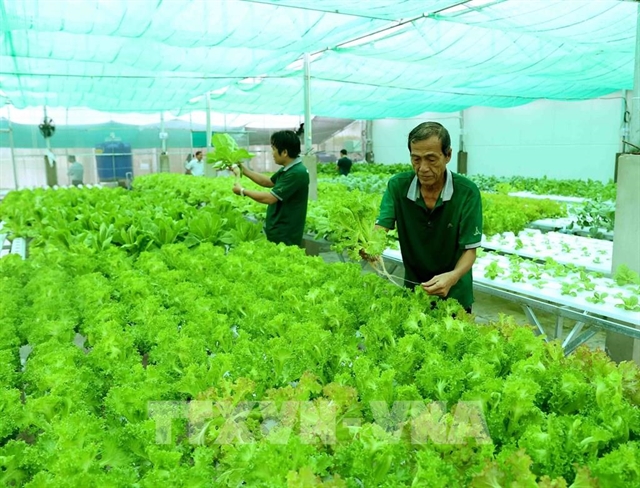 Economy
Economy

 |
| Harvesting organic vegetables at Kiên Giang Organic Agricultural Cooperative. VNA/VNS Photo Vũ Sinh |
HÀ NỘI — Việt Nam needs to specify target markets and control the implementation of standards in organic agricultural production to meet the needs of the domestic and foreign markets.
At a forum on the development of organic farm produce held by the Ministry of Agriculture and Rural Development (MARD) on Monday in HCM City, Trần Thanh Nam, Deputy Minister of Agriculture and Rural Development, said that organic agricultural production must be associated with the development of the consumption market.
Organic products with specific characteristics must comply with strict standards and often have low yields and high costs. These products are for the high-end market segment.
According to Nam, organic agriculture development must be the right way to approach potential customers at home and abroad.
Along with reasonable planning, standards and management for the production and certification of organic agricultural products must be strictly implemented to improve the quality of Việt Nam's certified organic products.
Vietnamese organic farming products are exported to about 180 countries and territories, with an export turnover of $335 million per year. The exported organic farming products are tea, shrimp, rice, cashew nuts, pepper, cinnamon, anise, essential oils, and spices.
The main export markets of those products include France, Denmark, Switzerland, Sweden, mainland China, Cambodia, USA, Italy, Germany, UK, Russia, Canada, Belgium, Thailand, Malaysia, Netherlands, Hong Kong and Taiwan.
According to MARD, market research companies believe that the demand for organic food is on a strong upward trend and even exceeds the supply on the world market.
The scale of the global organic food market is forecast to have an annual growth rate of 14 per cent during 2021-26, from $227.19 billion in 2021 to $259.06 billion by 2022 and $437.36 billion by 2026. The regions having the fastest growth are North America and Europe.
The Government has issued Decree 109/2018/NĐ-CP on organic farming regulations and a scheme for developing organic agriculture from 2020 to 2030, creating a foundation for the development of Việt Nam's organic agriculture industry, according to Nguyễn Quốc Toản, Director of MARD's Department of Agricultural Product Processing and Market Development.
As a result, the area of organic agricultural production is increasing rapidly and has so far reached 174,351 ha, 47 per cent higher than that in 2016. The variety of organic farming products is also increasing though output is lower than expected.
Most localities produce organic farming products. In addition, the number of organisations and individuals doing organic agricultural production is increasing.
Organic agricultural products are mainly consumed in big cities such as Hà Nội, Đà Nẵng and HCM City at modern distribution channels such as trading centres, supermarket chains, and convenience stores. Organic farming products on the domestic market are mainly rice, vegetables, fruits, meat, tea, coffee, pepper and cashew nuts.
However, the supply still needs to meet the demand, and many certified organic farming products are for export.
Toản said that developing organic agriculture in Việt Nam had faced many difficulties and obstacles and had not had significant results.
There were difficulties in awareness, production costs, input materials, human resources and technology application. Some other major areas for improvement needed more specific support mechanisms and policies to encourage investment and development for organic agriculture. The support scale was small compared to real needs.
Lê Trọng Kha, CEO of LeKhaMart, said that Việt Nam's organic agricultural production was still fragmented, and the production area was still modest and not concentrated.
The planning and linkages among regions and enterprises in rural areas still needed to be improved. In addition, the organisation of production chains had yet to be implemented on a large scale, so the development of organic agriculture had not gained significant results.
The development of organic agricultural products follows the trend but needs to meet strict standards under the standard organic certification, however, according to Kha, the maintenance of organic standards after being certified has yet to be taken seriously.
Việt Nam should have strict sanctions to create fairness and transparency in organic farming development, he said. VNS